What are the symptoms of bowel disease in humans. Diet to restore the stomach and intestines, weekly menu
Bowel diseases are most often the result of dysentery, infection of protozoa (giardia, amoeba, trichomonads), various intoxications (mercury, arsenic, etc.), violations of the diet and quality of nutrition, and prolonged adherence to too sparing defective diets and stomach injuries.
The inflammatory process is localized either in the subtle (enteritis). either in the large (colitis) intestine, sometimes spreads throughout gastrointestinal tract (enterocolitis).
Intestinal diseases are divided into acute and chronic. Timely and proper treatment avoids the transition of the disease into a chronic form.
A significant role in the treatment of chronic intestinal diseases belongs to clinical nutrition. When prescribing therapeutic nutrition, it should be borne in mind that all food products according to their effect on intestinal function are divided into three groups:
- emptying
- holding him and
- virtually no strong effect on bowel movements.
Food products that promote bowel movements include sugary substances (sugar, syrups, honey, sweet fruits) and substances rich in salt (pickles, marinades, smoked meats). Intestinal emptying is accelerated by eating foods rich in plant fiber (brown bread, sinewy meat, raw vegetables and fruits), organic acids (lemons, sour fruits), as well as fats, milk, kefir, fruit juices, mineral waters, koumiss, kvass, cold dishes and drinks.
Intestinal emptying is delayed by eating foods that contain astringents (tannins) that help slow intestinal motility (blueberries, strong tea, cocoa, natural red wine, mucous soups, jelly, mashed cereals, warm dishes, and liquids).
Steam and minced meat and fish, children's flour, significantly chopped (homogenized) vegetables, and well-baked wheat bread do not significantly affect bowel movements.
At acute enterocolitis prescribe diet No. 4. which does not contain products that enhance motor and secretory activity of the intestine and increase the fermentation processes in it. Raw vegetables and fruits, milk, smoked meats, spices are completely excluded from the diet; somewhat limit the amount of table salt, which leads to a decrease in the inflammatory process in the intestine; they introduce an increased amount of vitamins (C, Bb B2, PP) in the form of preparations.
5-7 days after the elimination or reduction of acute phenomena, patients are transferred to a diet of type No. 2- No. 46, and then a physiologically complete diet of type No. 15-No. 4c is prescribed.
Chronic enteritis or chronic inflammation of the small intestine is characterized by two groups of symptoms: intestinal symptoms (bloating, rumbling, diarrhea, polyphecalis, etc.) and changes in the general condition of the body (weight loss, edema, vitamin deficiency, anemia). Treatment of this disease should be systematic and lengthy. Medical nutrition prescribed to improve the general condition of the body, reduce inflammation of the mucous membrane of the small intestine, normalize secretory and motor activity of the small intestine.
Since the absorption process is often disturbed when the small intestine is damaged, a deficiency of substances such as calcium, iron, and vitamins develops in the body. Therefore, a patient with chronic enteritis should receive a large number of vitamins, especially B vitamins: B2 B2, Bj2, PP and calcium salts.
Excluded from the diet are substances that mechanically and chemically irritate the small intestines (raw vegetables, fruits, berries, nuts, brown bread, canned goods, whole milk, butter dough). Thus, the patient is prescribed a diet No. 2 and No. 46 with a standard protein supplement (100 g of meat or calcined cottage cheese, an egg). As the general condition improves and the intestinal activity normalizes, the patient is transferred to a diet of type No. 15. And in the presence of simultaneous damage to the liver or gall bladder with the same protein supplement of type No. 5 (diet options No. 15 and No. 5) with the exception of whole milk, cabbage, brown bread, fresh vegetables and fruits. With anemia, it is advisable to use dishes from the liver, hematogen.
Along with the diet, the patient, in addition to vitamins and calcium preparations for anemia, is injected with iron, vitamins B12, folic acid: carry out a transfusion of blood plasma and blood substitutes.
With chronic colitis or chronic inflammation of the colon, bloating, rumbling, abdominal pain, unstable stool - diarrhea or constipation, soreness along the colon; mucus and white blood cells appear in feces, changes in the mucous membrane found during rectoscopic and radiological studies. The inflammatory process extends either to all the large intestines (pankolitis), or to their part (left-sided, right-sided colitis). Changes in the general condition of the patient, as a rule, are not noted. They arise when observing a too sparing, defective diet (weight loss, weakness, hypovitaminosis), unsystematic use of antibiotics (vitamin disorders).
With a severe exacerbation of the disease, accompanied by frequent loose stools, abdominal pain, weakness, loss of appetite, the patient is prescribed diet No. 4 for 4-5 days. Then he is transferred to diet No. 2 or No. 46. and after normalization of the stool, improvement in general condition - on a diet number 4c. In chronic colitis, liver damage is sometimes observed. In such cases, the patient is transferred to a diet of type No. 5. in which they limit foods containing substances that irritate the liver (strong meat broths) and sharply limit foods that accelerate the movement of food through the intestines (whole milk, raw vegetables and fruits, brown bread, canned food, spices). Both diets are unprotected, high-grade and you can follow them long time. As the patient's condition improves, he should be encouraged to gradually include raw fruits and vegetables in the diet, and if lactic acid products are tolerated.
Sometimes in chronic colitis there is a violation of the motor function of the intestine due to changes in the nervous system. As a result of these disorders, constipation occurs when the stool is absent for several days, the patient has headaches, dyspeptic symptoms, weakness, and working capacity decreases.
The cause of constipation can also be insufficient consumption of food rich in plant fiber, artificial retention of the urge to defecate, decreased bowel tone, reflex effects from other organs and systems in case of their disease.
An important role in the treatment of constipation is played by the elimination of the cause of their occurrence, the elimination of the inflammatory process in the intestine, which often contributes to them, the strengthening of the nervous system (water procedures, physiotherapy, daily walks, observing the regimen of the day), elimination of hemorrhoids.
With right-sided colitis, which occurs with constipation, for a while, a pureed diet (No. 2 or No. 46) is prescribed, which includes non-coarse stimulants of intestinal peristalsis (fruit juices, fats, lactic acid products, sugary substances). As the inflammatory process in the colon decreases, as well as with left-sided colitis with constipation and constipation of a different origin, products that promote a more complete emptying of the intestine, for example, products containing coarse plant fiber, should be introduced into the diet of patients. A type 15 diet is prescribed (raw vegetables and fruits, brown bread). The diet of patients should contain a sufficient amount of vitamins (Bb, Br, B6, PP).
M.S. Marshak ("Dietary nutrition")
http://www.skovorodnik.ru
Bowel pain is often evidence of processes such as fermentation, bloating and rumbling in the stomach. Often pain is accompanied by problems with stools, as well as increased gas formation. Often, pain in the intestines can ruin all the plans that you built for the day. A diet for pain in the intestines is designed to alleviate pain for eating foods that are beneficial to the intestines.
Diet for sick intestines
A diet with a sick intestine suggests making small changes to the diet, which will help get rid of pain. These recommendations are based on the recommendations of doctors and nutritionists, therefore, observing them, the pain will disappear.
The diet for pain in the intestines recommends a moderate intake of laxatives in cases where the pain is accompanied by constipation. When constipation occurs again in the morning, you need to use a laxative, but you should not do this too often, because addiction can occur, and then the intestine will always function normally only with these drugs. The same applies to remedies for diarrhea. According to the recommendations of doctors, it would be better if you first try to deal with problems with stool due to natural remedies and only if they do not give a result, then switch to taking medications.
The universal remedy for both diarrhea and constipation can be considered the use of foods that contain fiber, since it can increase the volume of intestinal contents and soften it, which allows for constipation to achieve rapid emptying, and for diarrhea to normalize intestinal motility. To increase fiber in the diet, you should stick to the following menu:
- Breakfast: porridge with bran
- Lunch: a sandwich with cereal bread
- Dinner: baked potatoes, a serving of strawberries and half a serving of peas
The increased use of fiber may cause some problems, such as flatulence and bloating. If you have not previously used a diet rich in fiber, then it is worth starting with the use of dietary supplements that are based on fiber. Such dietary supplements include methyl cellulose and isfagula husk.
The diet for pain in the intestines also suggests focusing on pectin, since it, like fiber, contains dietary fiber. You can get pectin from oranges, papaya and grapefruit, as well as with the use of apple pectin, which serves as a special additive and is diluted in water or added to food.
A diet with a diseased intestine requires a double increase in water intake, since with it, the stool volume increases, and food moves through the intestines more intensively. The norm is 6-8 glasses of water per day, but it is important to remember that food should not be washed down with cold water.
A diet for pain in the intestines recommends thinking about maintaining a special food diary, in which it is worth entering information about what you ate, and how the body reacted to it. This will help identify foods that cause stomach pain. But you need to take into account the fact that when pain occurs, it may not be the food that you ate a long time ago, but rather the one that was used one or even two meals back.
It is worth giving up the use of wheat and dairy products, since they very often cause pain in the intestines. A food diary will help determine the reaction to these products, and if the negative consequences of their use are confirmed, they are completely excluded from the diet. Please note: wheat and milk are often found in many foods, so you should carefully study the composition.
Increased motor activity will also help normalize the functioning of the intestine, so you should think about running, swimming, or at least walking. It is necessary to conduct at least three classes per week, and if possible, try more, because good physical exercise do no harm.
With diarrhea, intestinal motility increases, it ceases to absorb fluid normally. Therefore, you need to eat foods that can reduce intestinal motility and resume its function of absorbing fluid.
In the early days of diarrhea, attention must be paid to the fluid. Need to drink a lot warm waterto help restore the body's water balance. Among healthy drinks one can distinguish such as strong tea with lemon, apple juices, alkaline non-carbonated drinks, decoctions of raisins, blueberries.
On the second day it is allowed to eat crackers without aromatic additives and powders. You need to eat a small portion every hour and drink plenty of fluids. On the third day, you can gradually introduce products that reduce intestinal motility and are most useful for, namely:
- and liquid cereals. Rice does not contain fiber (which acts as a laxative) and has fastening properties. It is recommended to eat one cup of rice porridge or porridge every 2 hours.
- Bananas Replenish the body with potassium, which is washed out of the body with diarrhea. For this, 2 bananas are used every 4 hours.
- Weak meat and chicken broths.
- that envelop the gastric mucosa (semolina, oatmeal, buckwheat).
- White bread crackers.
- Baked or boiled apples (contain elements that bind toxins and restore beneficial intestinal microflora).
- Low-fat fish and lean meat (without skin, bones and fat).
- Boiled carrots, and mashed potatoes from it. Enriched with vitamin A, which improves the condition of the weakened intestinal mucosa and has absorbent properties.
- Fine-grained low-fat cottage cheese, boiled eggs or steamed omelettes will replenish the body with proteins.
- Vegetable soups and mashed potatoes.
- Kissels and veins made from vitamin-rich fruits and berries.
Nutrition for constipation

Dried fruits help with constipation.
- This is the absence or difficulty in defecation. There are products whose use can increase intestinal motility, facilitate the rapid digestion of products, and their output in the form of feces.
The diet should include foods that activate the intestines and saturate the body with all the trace elements necessary for normal life.
As a rule, you need to eat more fiber and drink plenty of fluids, exclude foods that are difficult to digest and provoke. List of foods recommended for constipation:
- Whole wheat rye or wheat bread
- Vegetable rich soups, beetroot will be more useful
- Fresh vegetables, greens
- Fresh fruits (apples, kiwi, plums). Bananas and pears should be discarded.
- Low-fat varieties of fish and meat in boiled form or steamed as cutlets.
- Porridge: buckwheat, pearl barley, oat, wheat, corn.
- Dairy products (, yogurt, sour cream, yogurt).
Nutrition for chronic intestinal obstruction (paresis) has certain nuances. In this case, it is often necessary to eat in small portions. The optimal food temperature for easy absorption should be 38-40 degrees.
Food suitable for consumption is only chopped, which will facilitate digestion and reduce stool density.
Prohibited foods for bowel disease
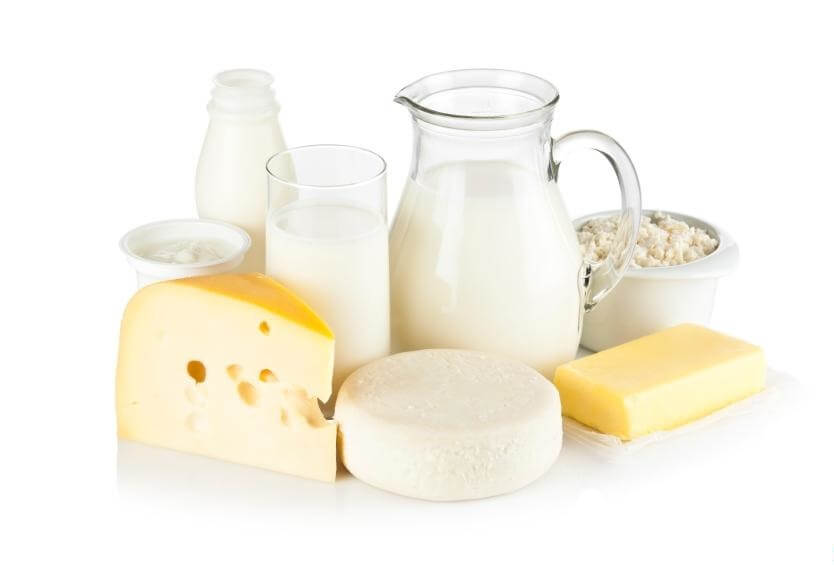
With bowel disease, dairy products are prohibited.
The daily menu for diseased intestines should not include those products that cause rotting and fermentation, contribute to gas formation.
Legumes and coarse fiber should be excluded. Vegetable fats are also not recommended, as they interfere with the absorption of nutrients.
Spices are irritating to. Products that are prohibited:
- Fatty meats and fish;
- Legumes;
- Nuts
- Spices
- Fried eggs;
- Very salty foods;
- Fried and smoked dishes;
- Canned food;
- Sweet dishes;
- Mushrooms;
- Coffee;
- Caviar;
- Alcoholic and carbonated drinks;
- Fast foods.
Bowel cleansing as disease prevention
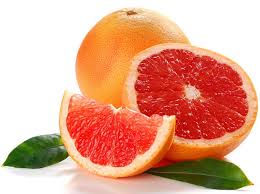
Grapefruit is a product that removes salts and toxins from the body.
From ancient times it was considered best remedy prevention of various diseases, not only the gastrointestinal tract.
In the intestine, waste substances regularly remain, which, normally, he himself must take out.
However, with improper nutrition, or the influence of other factors, the functionality of the intestine may be impaired, which over time, can lead to such serious consequences as, oncology of the intestine, hemorrhoids, myocardial infarction.
To prevent unpleasant manifestations, you need to include in the diet products that cleanse the intestines from toxins. There are special bowel cleansing programs that allow you to individually select products for each person.
However, for any program, there is one general requirement - to observe a plentiful drinking regime (at least 8 glasses of water per day). Every day of cleansing should start from a glass of water at room temperature drunk on an empty stomach. Products that can cleanse the intestines:
- Grapefruit. It removes salts and toxins from the body, increases appetite, cleanses the intestines. Grapefruit juice contains more nutrients than any other 100% fruit juice.
- and pribiotics. Effectively cleanse the intestines and increase healthy microflora.
- This includes all dairy products, bananas, sauerkraut, onions, garlic.
- Whole grain cereals. In the case of their proper preparation, they effectively cleanse the intestines.
- Buckwheat, millet, oatmeal, and barley will be useful.
- Products containing fatty acids. Vegetable oils, oily fish, seeds, seafood, as if lubricate the intestines from the inside, thus contributing to the elimination of toxins.
- and carrots. Beets are best consumed boiled, carrots can be eaten raw.
- Edible seaweed and sea vegetables. These foods are low in calories and contain a large amount of minerals and vitamins. They normalize the intestines, many bind toxins and remove them from the body.
Laxatives such as hay grass, salt water, magnesia are also suitable for quick bowel cleansing. It is important to know that with serious bowel disease, digestion can be very difficult. Therefore, nutrition should be fairly balanced and high-calorie. However, do not use foods that increase the load on the digestive system.
About irritable bowel syndrome - in the detailed video:
Have you noticed a mistake? Select it and press Ctrl + Enterto let us know.
Tell your friends! Share this article with your friends on your favorite social network using the social buttons. Thanks!
The intestines play a large role in the human body. It is through it that all the food digested by the stomach passes, which the loan splits into proteins, fats, carbohydrates, vitamins and minerals. With violations of its work, the absorption of these substances deteriorates, because of which the body begins to experience a deficiency.
But his work without them is simply impossible, so he begins to take them from his stocks, as a result, a person experiences rapid fatigue, dizziness, nausea, and even loses weight! However, he may experience constipation and diarrhea, which also cause additional discomfort. Therefore, when such problems arise, a diet for the intestines quickly helps to get rid of them.
A complete diet is required
Good nutrition is an opportunity to provide the body with additional substances that it lacks. Often, bowel disease leads to loss excess weight not only due to the disappearance of fat, but also due to the loss of muscle mass. Therefore, the patient must have protein in the diet. And the more it will be, the better.
Diet for bowel disease involves the consumption of at least 130 grams of protein per day for women, and more than 180 grams for men. In addition, you need to provide for yourself, which should occur 5-6 times a day. The smaller your portions will be in volume and the more often you will eat, the better will be the digestion of food and the assimilation of nutrients, since the load on the internal organs will be small.
Since the absorption of vitamins and minerals decreases with intestinal diseases, the body begins to experience a deficiency in them, and therefore it needs to be helped. Unfortunately, changes in the diet alone will not be enough. An additional technique will be required. vitamin complexes.

Very important! Any medicines, including vitamin complexes, should occur only as prescribed by the doctor, as self-medication can lead to poor health and exacerbation of the disease.
Requires the use of large quantities of dairy products.
Dairy products contain a sufficient amount of phosphorus and calcium to maintain their balance in the body. In addition, they also contain a lot of fats and proteins, which are easily absorbed and do not burden internal organs.
Some people who suffer from bowel disease do not tolerate pure milk and fermented milk products. Therefore, they are advised to eat low-fat fresh cottage cheese and unsalted cheeses. They also contain a sufficient amount of these substances.
Therefore, experts recommend giving up tasty and healthy kefir and replace it with equally healthy and tasty cheese.
It is required to take into account the characteristics of the disease
All other food products are selected based on the characteristics of the disease. After all, those foods that are indicated for constipation and have a laxative effect, in no case should be consumed with diarrhea. And vice versa.
Diet for bowel disease, which is accompanied by constipation, requires the inclusion in the diet of foods that have a laxative effect and stimulate the work of the body. After all, it is the wrong and unbalanced diet that leads to this problem.
Wherein chemical composition The daily menu should consist of 100 grams of animal protein, 120 grams of vegetable fats and 400 grams of carbohydrates. In this case, the daily calorie intake should not exceed 3000 kcal.
Products that enhance intestinal motility are rich in sugars, sodium chloride, organic acids, dietary fiber, connective tissue, carbon dioxide and fats. These products include:
- vegetable soups (you can also soups prepared on meat broth, but in a limited quantity - not more than 100 grams);
- lean meat;
- chicken, turkey;
- fish;
- yesterday’s bread made from wholemeal flour;
- friable cereals made from wheat and buckwheat;
- laxative vegetables: beets, cucumbers, pumpkin, tomatoes, carrots, zucchini, cauliflower;
- dairy products;
- sweet fruits (they should be consumed in large quantities, especially apricots and plums);
- dried fruits;
- jam;
- marmalade;
- decoctions of wheat bran and wild rose;
- freshly squeezed vegetable and fruit juices.
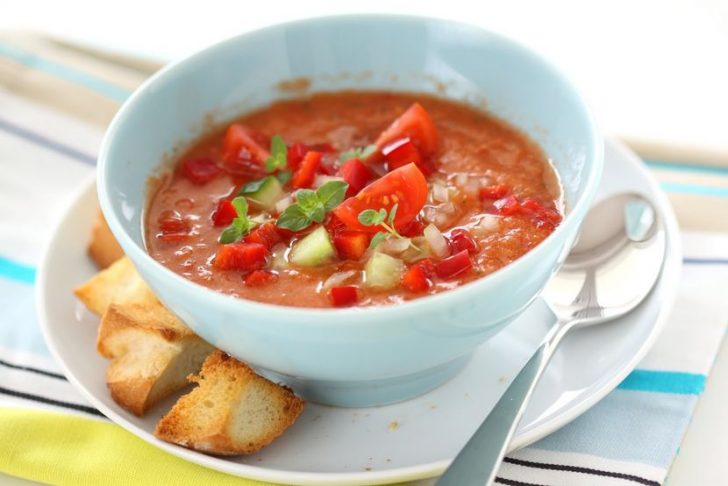
To avoid exacerbation of the disease, with constipation it is highly recommended not to use products such as:
- bread made from premium flour;
- any pastry;
- all types of smoked meats;
- fatty meats and fish;
- legumes;
- semolina;
- all kinds of pasta;
- absolutely all mushrooms;
- jelly;
- garlic and onions;
- chocolate;
- spicy seasonings - horseradish, mustard, black pepper;
- various confectionery products containing fatty creams;
- quince;
- cocoa;
- strong tea and coffee.
All these products help strengthen feces, reduce intestinal locomotor activity and contribute to the development of constipation. That is why the diet for intestinal disease excludes them from the patient’s diet.
There are foods and dishes that practically do not affect the intestinal motor activity. Therefore, they can be consumed by absolutely all patients. These include:
- steamed dishes from minced diet meat;
- steamed or boiled fish;
- fresh unleavened cottage cheese;
- yesterday’s baking from wholemeal flour.
All these foods can be eaten without any fear. They are easily digested and absorbed by the body, while not exerting a heavy load on it.
Diarrhea is a condition in which there is irritation of the intestinal wall and its frequent emptying. It is dangerous, as it can lead to dehydration. Therefore, as soon as the first signs of diarrhea begin to appear, measures should be taken immediately to treat it.

Can I drink some medicine, which will help stop the onset of symptoms of the disease. But this will only help temporarily stop diarrhea. Her true treatment is to follow a special diet.
Causes of intestinal disorders can be very diverse. If diarrhea is accompanied by vomiting, nausea and dizziness, you should immediately consult a specialist.
Symptoms such as discolored stools, red stools, bloating, darkening of the eyes, weakness, fever, vomiting and nausea can indicate the presence of diseases that can be life-threatening.
A diet for intestinal upset can be used on its own only if diarrhea is not accompanied by the above symptoms. Its main task is to provide the body with all the necessary substances, while providing a minimum load on the digestive tract.
All this is possible only if:
- decrease in daily intake of fats and carbohydrates;
- increase in daily intake of animal protein;
- exceptions from the diet of foods that contribute to increased intestinal locomotor activity;
- exceptions from the patient's diet of foods that contribute to causing fermentation and rotting in the intestine.
In this case, the patient's nutrition should be fractional, with a predominance of liquid and warm food, with a total calorie content not exceeding 1900 kcal. Such nutrition will help reduce the load on the digestive tract and eliminate the symptoms of diarrhea.
The food that will be consumed should be light and well absorbed by the body. And in order to achieve this, it should be steamed or simply boiled in slightly salted water. And before using it, you need to thoroughly wipe it.
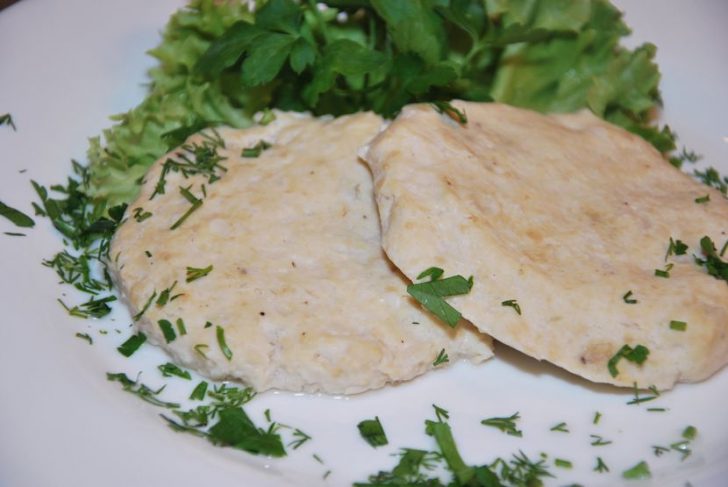
Knives, soufflés, steam cutlets made from diet and lean meat are an ideal source of animal protein. In addition, they are low in fat and carbohydrates. Just what the diet requires for an upset bowel.
With manifestations of diarrhea, foods such as:
- fresh fresh cottage cheese;
- soft-boiled eggs or cooked as a steam omelet;
- jelly made from fresh berries and fruits;
- baked apples (they should be wiped before use);
- butter (it can not be consumed in its pure form, it can only be added to ready meals);
- steam cutlets, souffle, dumplings;
- wheat crackers
yesterday’s bread made from wheat flour.
Prohibited foods include:
- all types of canned food;
- smoked meats;
- marinades;
- milk;
- kefir, fermented baked milk;
- teas and coffee with added sugar and milk;
- carbonated drinks;
- cocoa;
- fatty meats and fish.
In addition, the use of too hot or cold food is prohibited, as it contributes to irritation of the intestinal mucosa. It is also not recommended to use alcoholic beverages during manifestations of diarrhea, as they contribute to even greater dehydration of the body.
Fruits contain coarse fibers that contribute to gastrointestinal irritation, so they should be excluded from the diet at the time of feeding. For the same reason, it is not recommended to eat vegetables. Legumes are also prohibited, as they lead to the formation of a fermentation process in the intestines, and with diarrhea this can lead to a deterioration in well-being.

It’s very important to take rehydrating drugs for an upset bowel. They help the body maintain its strength and prevent its dehydration, by restoring the water-alkaline balance.
If there is no such tool in your home medicine cabinet, then you can easily cook it yourself. To do this, take a liter of chilled boiled water and dilute in it a tablespoon of sugar, a teaspoon of salt and half a teaspoon of baking soda. This solution should be taken every 10-15 minutes in small sips.
In addition to this solution, you need to drink plenty of water. This is a very important nuance. This helps to replenish the lost fluid in the body and improve well-being.
And the most important thing! If you are treating diarrhea on your own, but do not observe a positive result within 24-48 hours, an urgent appeal to a specialist is required! Otherwise, you risk earning yourself various “bonuses” in the form of dehydration and other diseases.
Intestinal Diet Video
7 873 0
Medical dietetics is the science of healing with help. intestines 4 - this is a sparing menu with which inflammation, fermentation and putrefactive processes of the intestines are reduced, the functioning of the digestive tract is normalized.
The basic rules of diet
The menu in question is prescribed for a variety of intestinal pathologies:
- acute diseases of the small and large intestine;
- chronic pathology during exacerbations (with the development of profuse diarrhea and dyspepsia);
- the first time after surgical action on the intestines.
The main objective of such a diet is to protect the intestines and stomach as much as possible from additional loads, reducing fermentation in the digestive tract. The menu should choose a balanced, but gentle, to minimize all sorts of irritations. It is important to observe bed rest.
Diet No. 4 is prescribed for diarrhea caused by dysentery, gastroenteritis, chronic colitis with exacerbations, typhoid fever and tuberculosis. The essence of such nutrition is to minimize fats and carbohydrates against the background of high-grade protein in the diet, so it has a reduced calorie content. Shown is liquid, semi-liquid, mashed, mashed, boiled, steamed food. Hot is strictly forbidden. List of products not recommended for use:

Frequent meals - every 4 hours. This menu is adhered to up to 5 days due to its inferiority and uniformity. Then patients switch to diet No. 2 or No. 5a.
Requirements for such a diet:
- calorie content - not less than 2000 kcal;
- proteins not less than 90 g, fats - not more than 70 g, carbohydrates - 250 g; salt must be reduced to 6 g;
- the volume of liquid is 2.0 liters.
The diet should be balanced every day:
- retinol 2 mg;
- thiamine 4 mg;
- ascorbic acid 100 mg;
- calcium 0.8 g;
- phosphorus 1.6 g;
- magnesium 0.5 g;
- iron 0.015 g.
Sample menu
Every day with diet No. 4 you can eat:
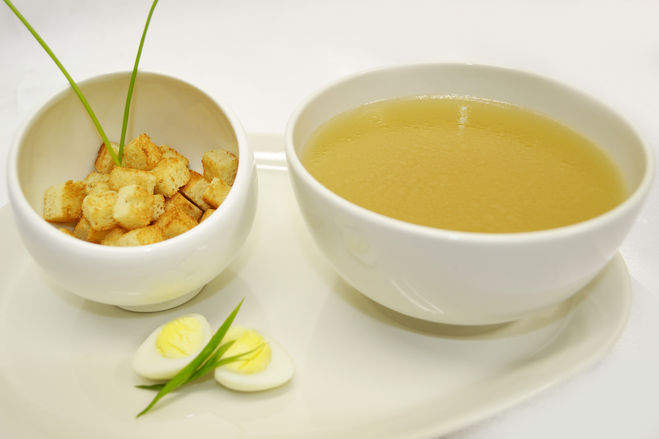
- Fresh bakery and flour products, pastries, puffs.
- Snacks
- Strong broths.
- Fatty meats, fish; smoked meats, canned food.
- Milk.
- Millet, pearl barley.
- All kinds of legumes.
- Fresh vegetables, fruits and berries (except apples).
- Sweets, drinks with milk (coffee, tea, cocoa), soda.
Classification of a rational diet
There are several modifications of the table number 4. and the intestine should be suitable for one or another pathology. Table No. 4a - the menu is prescribed for pathologies of the stomach, pain in the intestines. Such a diet for pain minimizes the amount of food, which can increase the fermentation in the intestines. Calorie diet - not more than 1600 kcal, it contains 120 g of protein, 50 g of fat and 140 g of carbohydrates. It is prescribed for the first period of treatment (2-5 days) due to its uniformity and imbalance.
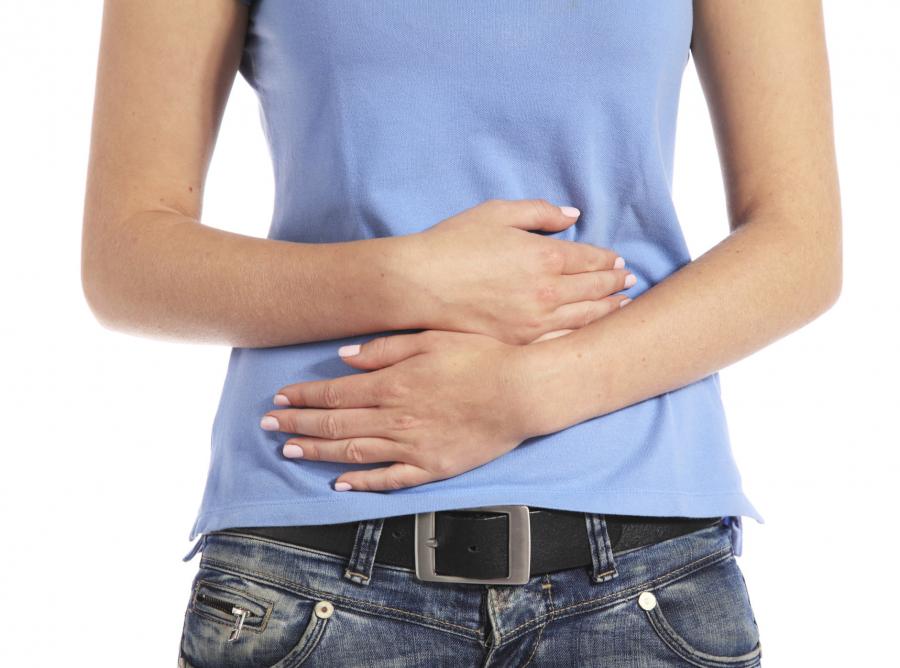 Table No. 4b - with exacerbation of chronic diseases of the stomach and intestines. It is prescribed to people when combining the pathology of the intestine and pancreas, liver, hepatic tract and a sick stomach. Such a diet is often followed for adhesive bowel disease and pain in the stomach.
Table No. 4b - with exacerbation of chronic diseases of the stomach and intestines. It is prescribed to people when combining the pathology of the intestine and pancreas, liver, hepatic tract and a sick stomach. Such a diet is often followed for adhesive bowel disease and pain in the stomach.
Often it is administered to balance nutrition with initial gastrointestinal pathologies. The food is fully balanced and physiological. It reduced the amount of all kinds of irritants, salt. Cooked food, steamed, mashed. Eating only warm food is recommended. Carbohydrate intake has been shown to reduce bowel movement. The ratio of proteins, fats, carbohydrates should approach 1: 1: 4. The amount of salt should not exceed 7 g. It is necessary to drink at least 1.5 liters of still water.
Table No. 4c is considered a transitional diet from diet to a common table. It is prescribed for remission of the pathology of the intestine, stomach, with a combination of pathology of the intestine and liver, diseases of the pancreas and biliary tract. Nutrition is becoming more diverse. Often, diet 4c is prescribed after 4b. The purpose of diet 4c is full proper nutrition with remission of intestinal pathology and with healing after acute diseases of the digestive tract.
Such a diet is completely physiological, has a sufficient content of proteins, fats, carbohydrates. The daily intake of salt is slightly reduced. The food is steamed, boiled, baked in the oven. Food is not chopped, served 6 times. The ratio of proteins, fats and carbohydrates is 1: 1: 5. The energy value of the diet is 3000-3200 kcal. The daily intake of salt is reduced to 8 g. You need to drink at least 1.5 liters of water per day. Limited allow you to eat fried foods and breaded.
- fresh bread and pastries;
- fatty and saturated broths;
- fatty meat and fish, all smoked dishes, canned food;
- legumes;
- fresh fruits, vegetables, berries;
- coffee, cocoa, strong tea, soda.
Supplementary Nutrition
Table No. 4ag - meals intended for patients with celiac pathology of the intestines. This is a genetic deficiency of enzymes (peptidases), which in the intestines break down gluten (a component of proteins found in cereals).
![]() The food is rich in proteins, fats and carbohydrates, contains a large amount of vitamins, calcium salts. Food is prepared in gentle ways: boiled or steamed. The energy value is 3100 kcal, proteins, fats, carbohydrates are correlated as 1: 1: 5. Sodium chlorine - not more than 8 g.
The food is rich in proteins, fats and carbohydrates, contains a large amount of vitamins, calcium salts. Food is prepared in gentle ways: boiled or steamed. The energy value is 3100 kcal, proteins, fats, carbohydrates are correlated as 1: 1: 5. Sodium chlorine - not more than 8 g.
Celiac disease is a serious pathology, in some cases severe exhaustion and death are possible. Strong dystrophic changes require hospitalization in the intensive care unit. Treatment begins with parenteral nutrition with protein preparations - for a start, a small concentration is used - 0.6 g / kg of patient weight per day (this is the minimum amount of protein for a person to exist). Gradually, every day the amount of protein is increased to 4 g / kg of weight. Protein reserves are replenished using special amino acid solutions.
After stabilization, the amount of parenteral protein is gradually reduced, and the amount of food protein is increased. With celiac disease, the patient is administered parenteral fat preparations - emulsions (on average about 4-5 times). Then fats enter the body with food. To meet the carbohydrate needs of the body, glucose and fructose solutions (5, 10 and 20%) are used, controlling blood sugar.
If all the recommendations of the doctor are followed and the gluten-free diet is followed, the prognosis is favorable. Strict gluten-free menu is observed for about a year. Then gradually introduce gluten products. If the patient worsens, they completely return to the previous menu.
Baby food for celiac disease
The nutrition of children with this pathology should adhere to the following rules:
- pureed food appropriate for age;
- fractional nutrition in small portions, frequent;
- food is allowed to stew, cook;
- vegetables and fruits are eaten without peel;
- berries are undesirable;
- restrict mushrooms, nuts and raw cabbage on the menu;
- minimally consume spices;
- limit whole milk as much as possible;
- domestic milk is allowed with good tolerance;
- sweets are allowed in full (simple carbohydrates - food for the brain);
- continuous use of bifidopreparations (Lactobacterin, Latsidofil) up to 10 doses in the morning on an empty stomach;
- a mixture of sea buckthorn oil and honey for diseases of the intestines and a sick stomach perfectly restores the intestinal mucosa and normalizes acidity;
- sources of protein: fish fillet, meat, eggs;
- lipid-rich foods: fatty meat, milk, fish;
- many carbohydrates are found in rice, corn, buckwheat, starch, fruits, vegetables, honey, jam.
Correct and effective healing from celiac disease significantly improves a person’s condition:
- the chair becomes decorated and rare;
- weight gradually increases;
- lethargy, weakness disappears;
- performance improves.
With such diseases, it is strictly forbidden to use:
- infant formula with oats, barley, wheat;
- bread, cookies, semolina, oatmeal;
- canned food, sausages, sausages, sausages;
- sweets, caramel, chocolate, absolutely all baked goods;
- sauces, marinades, mustard;
- beer, vodka, soda.
- flakes, chips;
- ice cream, yogurt;
- cocoa, coffee, tea in granules;
- chewing gum.
Table 1 is used to reduce inflammation, heal wounds, and normalize gastric motility.
In terms of energy value, protein, fat and carbohydrate content, table 1 is a complete diet. Food is served to the patient in mashed, boiled or baked form. Salt is limited. All diet food is served warm. The energy value is about 3000 kcal, the ratio of proteins, fats and carbohydrates is 1: 1: 4. Table 1 requires compliance with 6 meals a day at the same time. Be sure to recommend drinking milk, cream, jelly for diseases of the gastrointestinal tract.
When dieting are allowed:
☀ crackers from 200 g of premium wheat bread, thinly sliced \u200b\u200band not toasted;
☀ soups on low fat low meat (or fish) broth with the addition of mucous decoctions of cereals, semolina, rice, boiled and mashed meat, steam knives and meatballs, egg flakes;
☀ low-fat and non-fatty varieties of beef, veal, chicken, turkeys, rabbits. (The meat is degreased, fascia and tendons are removed, and the skin of birds.) Steam or water-cooked meatballs, dumplings, meatballs. Minced meat with boiled rice instead of bread 3-4 times is passed through a fine grinder meat grinder. Souffle from boiled meat;
☀ non-greasy types of fresh fish in pieces and minced (dumplings, meatballs cutlets), steamed (or in water);
☀ freshly prepared calcined or fresh mashed curd, steam soufflé;
☀ soft-boiled eggs (up to 1-2 per day), steam omelet and in dishes;
☀ mashed cereals on water or fat-free broth - rice, oatmeal and buckwheat, from cereal flour;
☀ vegetables (only in the form of decoctions added to soups);
☀ jelly and jelly from blueberries, cornel, bird cherry, quince, pears. Rubbed raw apples. Sugar - limited;
☀ low-fat broth and butter (in dishes);
☀ tea, especially green, black coffee and cocoa on the water. Decoctions of rose hips, dried blueberries, black currants, bird cherry, quince. With tolerance - diluted fresh juices from berries and fruits (except grapes, spruce apricots);
☀ only very fresh butter (5 g per serving of the finished dish).
When dieting excludes:
☀ other bakery and flour products;
☀ soups with cereals, vegetables, pasta, dairy, strong fatty broths;
☀ fatty types and varieties of meat, piece of meat, sausages and other meat products;
☀ fatty species, salted fish, caviar, canned food;
☀ whole milk and other dairy products;
☀ hard-boiled eggs, raw, fried;
☀ millet, pearl barley, barley groats, pasta, legumes;
☀ natural fruits and berries, dried fruits, fruit drinks, honey, jam, other sweets;
☀ coffee and cocoa with milk, carbonated and cold drinks.
Sample menu of the day
1st breakfast. Oatmeal mashed on water, freshly prepared curd, tea.
Oatmeal porridge mashed in water:
40 g of oatmeal, 400 ml of water. Dip the groats in boiling water and cook under the lid until boiling (15 min). Wipe the cooked cereal through a hair sieve. To accelerate cooking, grits can be ground in a coffee grinder.
2nd breakfast. A decoction of dried blueberries.
Dinner. Meat broth with semolina, steamed meatballs, mashed rice porridge on water, jelly.
Semolina broth:
350 ml of meat (or chicken) broth, 15 g of semolina, 2 g of dill (or parsley). Sift semolina and pour in a thin stream into the slightly boiling broth. Stir well and cook over low heat for 15-20 minutes. When serving, sprinkle the dish with herbs.
Steamed meatballs:
60 g lean meat, 5 g butter, salt. In minced meat, passed through a meat grinder with a fine wire rack, add salt, oil and mix well. To form meatballs from it. Steam them.
Pounded rice porridge:
40 g of rice, 400 ml of water. Sort the groats, rinse first with warm and then hot water. Dip the rice in boiling water and cook under a lid until cooked (1 hour). Wipe the cooked porridge through a hair sieve. To accelerate cooking, grits can be ground in a coffee grinder. To do this, first rinse and washed cereals, then grind and sift. Cook with stirring.
High tea. Rosehip unsweetened warm broth.
Dinner. Steam omelette, buckwheat porridge mashed on water, tea.
Steam Omelet:
2 eggs, 5 g butter, dill. Beat eggs with finely chopped dill and steam them. When the mass thickens, put the butter and roll the omelette roll so that it remains soft inside.






